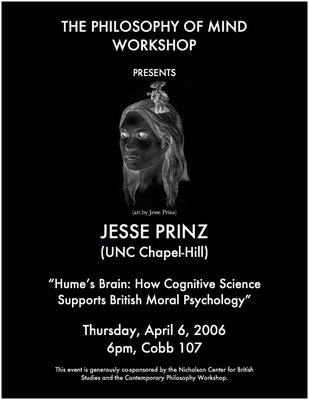Tonight the workshop met for a double shot of J.L. Austin.
First Ben McMyler offered his revisionary reading of Austin's "Other Minds".
Then we discussed chapters I-IV of Sense and Sensibilia.
Jason gave a characteristically lucid and provocative account of Austin's way of responding to the argument from illusion.
The Argument From Illusion (As reconstructed by Jason)
(1) An example of a deceptive or illusory experience of an F is given.
(2) In such a case you see or experience something F.
(3) In such a case you're not seeing/experienceing a material F.
(4) Therefore, in such a case, you must be experiencing an F-ish sense datum (you must be experiencing something that is F or F-like).
------------------------------------------------------------
This first stage of the argument from illusion does not yet purport to establish the more ambitious claim that a subject is always experiencing a sense-datum, even in non-deceptive/illusory cases. To get to that conclusion, we need to add the following:
(5) A deceptive experience of an F can be indistinguishable from a veridical experience of an F.
(6) The deceptive and the veridical experiences, when indistinguishable, must have the same content (be of the same thing).
(7) Therefore, what we see/experience in both cases is a sense datum.
(8) Therefore, you only ever see an F indirectly.
Obviously, there are various problems with the argument as outlined above. Jason eventually wondered why Austin picks on the argument in the particular way(s) that he does in S&S. But first Jason said that he thought that the primary motiviation for invoking sense data is anti-skeptical, and that the argument from illusion is meant only as a secondary move to "buttress" the introduction of sense data.
How does Austin criticize the argument from illusion? Jason suggested two possible ways of reading Austin's criticisms. Either Austin simply tries to show that one or more of the premises of the argument is false, or, more ambitiously, he tries to show that all attempts to formulate the argument from illusion are confused.
I said that in his discussions of the bent stick, the mirror, and the mirage, Austin seems to criticize different parts of the argument. For example, Austin agrees that when one sees a straight stick placed in water, it makes sense to say that it looks bent. But, in the following passage, Austin seems to take issue with both (2) (3) in the argument given above:
"...we are told, in this case you are seeing something; and what is this something 'if it is not part of any material thing'? But this question is, really, completely mad. The straight part of the stick, the bit not under water, is presumably part of a material thing; don't we see that? And what about the bit under water?--we can see that too. We can see, come to that, the water itself. In fact what we see is a stick partly immersed in water..." (p.30).
In the mirror case, Austin clearly rejects (3), that when it "appears [that my body] is some distance behind the glass" (p.31), "I am not seeing a material thing". He also says that I see the mirror, and I see my body in the mirror, which suggests (to me, at least), that Austin is also rejecting premise (2), that when it appears that F (that my body is behind the glass), I must experience something F-ish (something behind-the-glass-ish). No--what I'm experiencing/seeing is the mirror and my body "in" the mirror.
Austin seems to grant (1-3) in the case of the mirage, but denies that it follows that the person experiencing the mirage is "experiencing sense-data" (p.32).
After I described the different ways Austin approaches the examples, Jason asked whether the key premise in the argument from illusion is (2). It seems possibly the least plausible premise in the argument. Focusing on it might have made shorter work of the argument from illusion. Why spend time picking apart the language of those arguing for sense-data rather than going straight to the heart of the argument?
Zack then said that he thought he could modify the argument to make premise (2) more plausible. If (2) is changed to read:
(2') In such a case you see or experience something
(2') might be something that Austin accepts. In each case Austin discusses, Austin clearly thinks that we are seeing something: a stick submerged in water; our reflection in a mirror; and a mirage. So it might turn out that rejecting premise (2) isn't enough to bring down the argument from illusion.
Jason then said that he thinks Austin's way of criticizing his opponents is excessively uncharitable. Instead of trying to give a rational reconstruction of Price or Ayer's arguments, Austin is content merely to point out their mistakes.
Jay, sympathizing with Jason, contrasted Austin's philosophical method with Wittgenstein's. While Wittgenstein treats the confusions of the philosopher as confusions that we are all prone to, Austin treats them as careless mistakes.
(This difference was disputed, to some extent, by some members of the workshop, including I think Ben and maybe David F.)
We meet again in two weeks to discuss more of Sense and Sensibilia.






